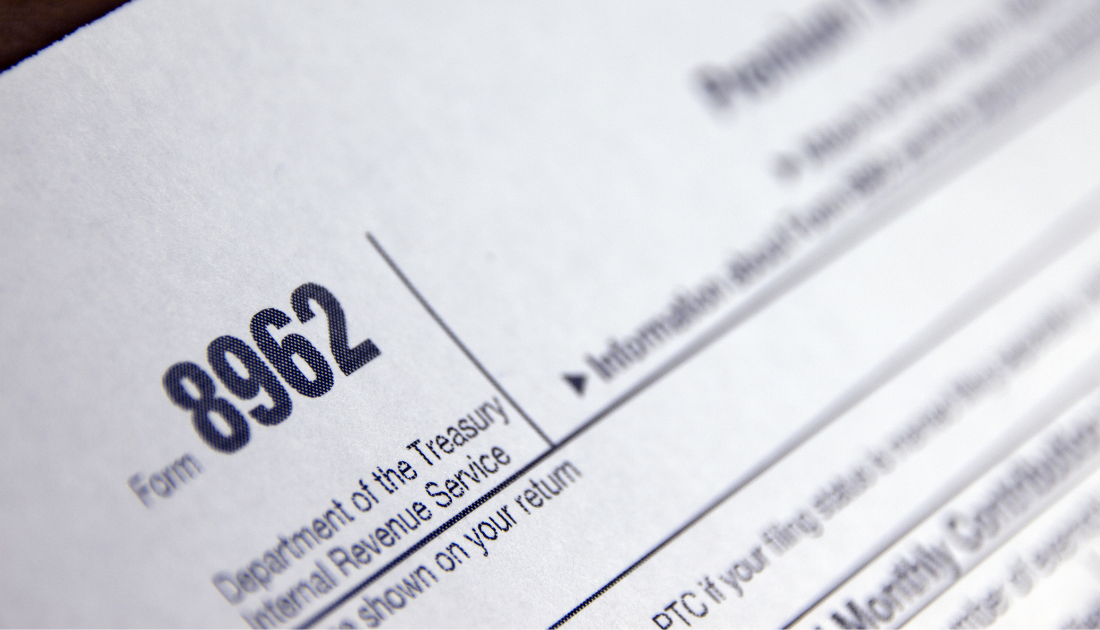The Premium Tax Credit: When Can You Get a Healthcare Tax Credit?

Just the Essentials...
- The Premium Tax Credit is a refundable credit that you receive once you purchase health insurance through the Affordable Care Act (ACA) Marketplace.
- There are certain qualifications that you must meet to be eligible for the Premium Tax Credit.
- Certain life changes may affect your Premium Tax Credit.
- You can choose to use your Premium Tax Credit toward the cost of monthly premiums, or you can collect it at the end of the year.
- It’s important to know which documents and forms you’ll need to file to get a Premium Tax Credit.
Understanding the Healthcare Tax Credit
“You can get a tax credit by purchasing health insurance? Since when do you get a healthcare tax credit? I’ve never heard of this before!”
It’s true! There is a way that you can get a tax credit by purchasing a health insurance plan. However, you must purchase your health insurance plan from a specific place to be able to receive this healthcare tax credit.
If you choose to purchase a health insurance plan through the ACA Marketplace, you may be eligible for a healthcare tax credit, known as the Premium Tax Credit. This credit is only available to those who purchase their health insurance through the ACA Marketplace. Let’s take a look at how you may qualify for the Premium Tax Credit.
Are you looking for a health insurance policy that can meet your needs? Enter your zip code above to find health insurance policies in your state that may be right for you today.
Who Qualifies for the Premium Tax Credit?
To receive the Premium Tax Credit, you must first have purchased your health insurance policy through the ACA Marketplace. To qualify after purchasing your health insurance policy, you must meet each of the following requirements.
- Your household income must be at least 100%, but not exceeding 400%, of the Federal Poverty Line (FPL).
- If you are married, you must file as “Married Filing Jointly”. There are exceptions to this rule, however, such as being a victim of domestic violence and spousal abandonment.
- You may not be claimed as a dependent.
- You must have an inability to obtain employer-sponsored health insurance coverage.
- You must not be able to qualify for any government-sponsored health insurance coverage, such as Medicare, Medicaid, or TRICARE.
If you would like to see whether or not you or your family qualify for the Premium Tax Credit, the IRS provides a handy tax tool for checking eligibility. You can also check this eligibility chart, also provided by the IRS.
How Life Changes Affect Eligibility for the Premium Tax Credit
If you qualify for the Premium Tax Credit, there are certain things that may either change the amount you qualify for, or even change your eligibility. Some of the life changes that can affect your credit amount or eligibility include:
- A recent marriage
- A divorce
- The birth of a child
- Adopting a child
- Your child aging out of being a dependent
- A change in your employment status
- Obtaining or losing employer-sponsored coverage
- Obtaining or losing government healthcare
- Moving to another address within your state
- Changes in your income
- Changes in Social Security benefits
- Death
When life changes occur, it’s important to report them as soon as possible so that you can get the help that you need. To report these life changes, simply go to healthcare.gov. To find out how a life change would affect your Premium Tax Credit, the IRS provides estimator tools that can help you get an idea of what you may stand to gain or lose.

Claiming and Reconciling Your Premium Tax Credit
When you purchase a health insurance plan through the ACA Marketplace, the Marketplace estimates how much of a tax credit you’ll get back at the end of the tax year. They make this estimation based on certain factors, such as:
- The size of your family
- Your projected household income
- Whether or not you’re eligible for non-Marketplace coverage
Once you receive your estimate from the Marketplace, you can choose whether to put some, all, or none of your credit toward your health insurance. Depending on how much of your credit you put toward your health insurance, you’ll be able to lower the cost of your monthly premium. These payments are known as Advance Credit Payments. If you’re ineligible for the Premium Tax Credit, or you choose not to put an amount toward Advance Credit Payments, you will be responsible for the full monthly premium to continue your health insurance coverage.
If you choose to put your Premium Tax Credit toward Advance Credit Payments, you must make sure to file Form 7862, Premium Tax Credit (PTC) at the end of the tax year. You should file this form even if you do not need to file a return. If you choose not to put your tax credit toward Advance Credit Payments, you can claim the full amount that you’re allowed to claim on your tax return.
For more information on how you can claim and reconcile your tax credit, please visit the IRS website.
Important Forms and Documents to File
To receive the Premium Tax Credit, make sure that you file the proper documents and forms. Below, you’ll find a list of the forms and documents you’ll need to file to receive your credit:
- Form 1095-A
- Form 8962
- Form 1040
You can also learn more about the Premium Tax Credit by reading Publication 974. If you would like to learn more about the ACA Marketplace or find important forms for yourself and your dependents, please check the following resources: the Health Insurance Marketplace Statements page and the IRS Questions and Answers section.
By being aware of all information available to you regarding the Premium Tax Credit and the ACA Marketplace, you can relieve a lot of the pressure of high health insurance costs on both yourself and your family. Finding health insurance that works for you should not be an impossible task. To get the help you need, it’s important to make sure to see if you may be eligible to receive the Premium Tax Credit.
Don’t let the fear of high premium costs keep you from finding a health insurance plan. Enter your zip code above to compare costs for health insurance plans available in your state.
Key Resources:
The Premium Tax Credit – The Basics
Eligibility for the Premium Tax Credit
Rules Regarding the Health Insurance Premium Tax Credit
Am I Eligible to Claim the Premium Tax Credit?
Premium Tax Credit Flow Chart: Are You Eligible?
Premium Tax Credit: Claiming the Credit and Reconciling Advance Credit Payments
How to Report Changes to the Marketplace
Affordable Care Act Estimator Tools
About Publication 974, Premium Tax Credit (PTC)
Health Insurance Marketplace Statements
